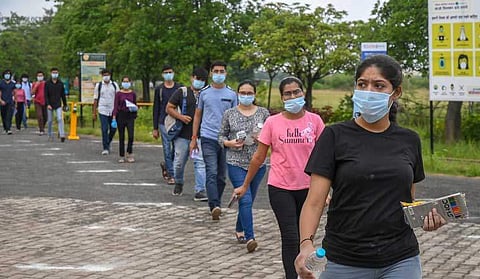

Amidst speculation of a fourth wave of COVID-19, schools are reopening across the country after a gap of almost two years. In the national capital, rising cases of COVID-19 are sparking concerns, among parents and school administrations alike, on the spread of the infection and the possible closure of schools yet again.
Schools will reopen after the summer vacation in Delhi. According to a report by PTI, parents and principals are anxious for there to be no further disruptions in the school calendar due to COVID-19. This means that all efforts are required to be in place to ensure students are getting accustomed to dealing with measures to live with the pandemic as it enters an endemic phase in the country.
Alka Kapur, Principal, Modern Public School, Shalimar Bagh told PTI, "While the schools are scheduled to open from July 1 after the summer vacations, increasing COVID cases have become a major concern for the parents yet again. The state government has stated that it is not in favour of any more disruptions in studies and aims to continue education while keeping the safety of students and teachers at prior."
"At our school, children with low immunity are provided with the option of staying at home, while parents can connect with the school authorities to get the class work of the student at home. Also, MPS has special classes for students seeking education in isolation," she added.
Delhi's Health Department, on the other hand, had some worrying news. Cases on Monday, June 20, hit a worrying high of four months with 1,060 new reported infections and 6 deaths. The positivity rate also jumped to 10.09 per cent, the highest on record since January 24 this year, during the third wave of COVID-19, driven by the Omicron variant.
Addressing the concerns of the parents in this scenario, Pallavi Upadhyaya, Principal, DPS RNE, Ghaziabad told PTI, "The concerns of parents about their child's safety are valid and we have made a personal effort to allay their apprehensions in the midst of the sudden rise in COVID cases. We have instituted strict abidance to COVID safety protocols, whether it's time-to-time cleanliness, issuance of hand sanitisers, or prohibition of gatherings in large groups." In addition to these measures, wearing of masks inside classrooms is mandatory and access to the playground and the rest of the campus is regulated and restricted in order to deal with the heatwaves in the city as well. "We have administered a special healthcare centre which is tasked to take care of unwell students and treat them with the utmost diligence," she added.
Notwithstanding these fears, parents are eager to send their wards back to school this year after the vacations. Elaborating on the measures in place to keep students safe at MRG School in Rohini, Principal Anshu Mittal told PTI, "We will ensure strict adherence to social distancing norms and also arrange drinking water facilities at common points to keep them hydrated at all times. Wearing masks is compulsory and social engagement in larger groups is not allowed. A medical ward with special staff to treat ill students is also in place. We have taken proactive steps to assuage parents' concerns and fears and they have been very positive and showed faith in us."
Schools had reopened completely in April this year after the third wave had passed. In the absence of offline classes, the issue of learning losses among students has been constantly raised by various experts. Any further disruptions might only aggravate this problem, added a report by PTI.
For now, the rise in the positivity rate has not yet pushed the city government to implement the graded response action plan (GRAP) devised by the Delhi Disaster Management Authority, given the fact that hospital admissions are low. The GRAP was put in place in August last year after the devastating second wave of the pandemic raged through the country.
